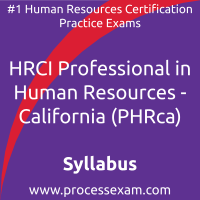 To achieve the professional designation of HRCI Professional in Human Resources - California from the HRCI, candidates must clear the PHRca Exam with the minimum cut-off score. For those who wish to pass the HRCI HR Professional in Human Resources certification exam with good percentage, please take a look at the following reference document detailing what should be included in HRCI HR Professional in Human Resources Exam preparation.
To achieve the professional designation of HRCI Professional in Human Resources - California from the HRCI, candidates must clear the PHRca Exam with the minimum cut-off score. For those who wish to pass the HRCI HR Professional in Human Resources certification exam with good percentage, please take a look at the following reference document detailing what should be included in HRCI HR Professional in Human Resources Exam preparation.
The HRCI PHRca Exam Summary, Sample Question Bank and Practice Exam provide the basis for the real HRCI Professional in Human Resources - California (PHRca) exam. We have designed these resources to help you get ready to take HRCI Professional in Human Resources - California (PHRca) exam. If you have made the decision to become a certified professional, we suggest you take authorized training and prepare with our online premium HRCI HR Professional in Human Resources Practice Exam to achieve the best result.
HRCI PHRca Exam Summary:
| Exam Name | HRCI Professional in Human Resources - California |
| Exam Code | PHRca |
| Exam Fee | USD $395 |
| Application Fee | USD $100 |
| Exam Duration | 135 Minutes plus 30 minutes administration time |
| Number of Questions | 115 |
| Passing Score | 50% |
| Format | Multiple Choice Questions |
| Books / Trainings | Training |
| Schedule Exam | Pearson VUE |
| Sample Questions | HRCI HR Professional in Human Resources Exam Sample Questions and Answers |
| Practice Exam | HRCI Professional in Human Resources - California (PHRca) Practice Test |
HRCI HR Professional in Human Resources Syllabus Topics:
| Topic | Details | Weights |
|---|---|---|
| Compensation/Wage and Hour |
- Developing and managing compensation programs for all employee groups through the appropriate regulatory interpretation and application. Responsibilities:
|
21% |
| Employment Lifecycle and Employee Relations |
- Managing the employer/employee relationship from recruitment through separation, fostering a positive working environment that facilitates employee retention. Responsibilities:
|
26% |
| Leaves of Absence and Benefits |
- Coordinating benefits, designating leaves, and managing the interaction between applicable regulations. Responsibilities:
|
14% |
| Health, Safety and Workers’ Compensation |
- Integrating health, safety and workers’ compensation regulations applicable to the organization. Responsibilities:
|
10% |
| Compliance and Risk Management |
- Mitigating organizational risk by identifying and addressing compliance obligations, educating stakeholders on non-compliance, and responding appropriately when claims are filed. Responsibilities:
|
29% |
Both HRCI and veterans who’ve earned multiple certifications maintain that the best preparation for a HRCI PHRca professional certification exam is practical experience, hands-on training and practice exam. This is the most effective way to gain in-depth understanding of HRCI HR Professional in Human Resources concepts. When you understand techniques, it helps you retain HRCI HR Professional in Human Resources knowledge and recall that when needed.
